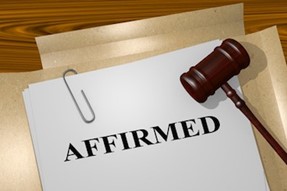|
Plaintiff, during her employment with Defendant, filed for FMLA (Family and Medical Leave Act) due to stress. On May 12, 2022, the Plaintiff was admitted to the hospital after feeling sick at work. Plaintiff was released to return to work on May 16, 2022, but instead filed for unemployment benefits. On May 22, 2022, the Plaintiff picked up her FMLA paperwork from work and alleges she was terminated via phone call with the Defendant. The Plaintiff submitted and was approved for FMLA from May 23, 2022, through August 15, 2022. The Plaintiff received notice that her FMLA had been approved on June 4, 2022. The next week, the Plaintiff began working for another employer.
On June 10, 2022, the Plaintiff’s application for unemployment benefits was received by the Claims Deputy, who denied her claim, finding she was ineligible to receive benefits. The Plaintiff appealed and presented her case before the Appeals Referee, who found that the Plaintiff was eligible for benefits. The Defendant appealed the decision to the Unemployment Insurance Board, who heard arguments on October 18, 2022. Following the Board hearing, the Board found that, although the Plaintiff was unemployed starting May 23, 2022, she did not qualify for benefits because her inability to work stemmed from medical records. Therefore, the Board reversed the Appeal Referee’s decision.
The Plaintiff appealed to the Superior Court arguing that she was terminated prior to her FMLA being approved and the disqualification of benefits ended once she became “able and willing” to work. Defendant argues that the Plaintiff was unemployed during the week ending May 23, 2022, and she is still disqualified from benefits because she failed to present evidence that she was able to resume work following her medical leave.
The Superior Court reviews the Board’s findings for substantial evidence, meaning that the Court will not reverse the Board’s findings if there is “such relevant evidence as a reasonable mind might accept as adequate to support a conclusion.” Under 19 Del. C. § 3302(17), a claimant may be considered unemployed if she performs no services for which wages are payable or if she works less than normal full-time hours. In this case, the Board found that the Plaintiff was not employed during the week ending May 23, 2022, because she did not perform any service for the Defendant.
Further, when an individual is unable to work due to a physical condition, they are disqualified from benefits. To prove that an individual is “able and available for work,” that individual must present evidence from a doctor confirming that he or she is released to go back to work without restrictions. In this case, the Plaintiff failed to present any such evidence.
Therefore, the Court affirmed the Board’s decision and found that the Plaintiff is not eligible for benefits because she was restricted from performing her job duties due to her medical condition, which was evidenced by her FMLA request.
Should you have any questions regarding this decision, or any liability law questions, please contact any attorney in our liability law department.
Kelly v. Felton Automotive Group, 2023 WL 4237272 (Del.Super., 2023)
|





